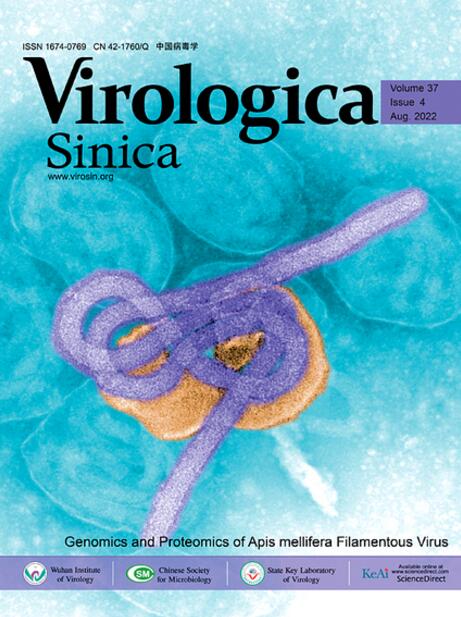ARRDC3促进溶酶体介导的YAP降解以抑制肠道病毒复制。
IF 4
3区 医学
Q1 Medicine
引用次数: 0
摘要
肠病毒D68 (EV-D68)和肠病毒A71 (EV-A71)是对公共卫生构成新挑战并有可能引起暴发的两种主要肠道病毒类型,但其致病机制在很大程度上仍未被探索。抑制蛋白结构域3 (ARRDC3)是葡萄糖代谢、癌症发展和炎症的重要调节因子。ARRDC3是否参与先天抗病毒免疫尚不明确。在这里,我们发现肠道病毒感染诱导ARRDC3 mRNA和蛋白水平的表达,从而抑制肠道病毒的复制。此外,我们证实了Hippo通路的关键效应物yes相关蛋白(YAP)的表达被ARRDC3通过溶酶体途径严重下调。在肠病毒感染的后期,YAP通过抑制干扰素途径促进肠病毒复制,而不依赖于其转录活性。最后,ARRDC3-YAP通路在各种病毒感染中显示出广谱抗病毒作用,包括由人类副流感病毒3型(HPIV3)和水疱性口炎病毒(VSV)引起的病毒感染。总的来说,我们的研究结果确定了ARRDC3在先天抗病毒反应中的关键作用及其对YAP的负调控作用,为对抗病毒感染提供了一种新的治疗策略。本文章由计算机程序翻译,如有差异,请以英文原文为准。
ARRDC3 promotes lysosome-mediated YAP degradation to inhibit enterovirus replication
Enterovirus D68 (EV-D68) and enterovirus A71 (EV-A71) are two major types of enteroviruses that pose emerging challenges to public health and have the potential to cause outbreaks, yet their pathogenic mechanisms remain largely unexplored. Arrestin domain containing 3 (ARRDC3) is a vital regulator of glucose metabolism, cancer development, and inflammation. Whether ARRDC3 contributes to innate antiviral immunity is undefined. Here, we found that enterovirus infection induces ARRDC3 expression at both the mRNA and protein levels, thereby inhibiting enterovirus replication. Moreover, we demonstrate that the expression of Yes-associated protein (YAP), a key effector of the Hippo pathway, is severely downregulated by ARRDC3 via lysosomal pathway. YAP facilitates enterovirus replication by suppressing the interferon pathway during the later stage of enterovirus infection, independent of its transcriptional activity. Finally, the ARRDC3-YAP pathway exhibits a broad-spectrum antiviral effect in various viral infections, including those caused by human parainfluenza virus type 3 (HPIV3) and vesicular stomatitis virus (VSV). Collectively, our results identify the critical role of ARRDC3 and its negative regulatory effect on YAP in the innate antiviral response, suggesting a novel therapeutic strategy against virus infection.
求助全文
通过发布文献求助,成功后即可免费获取论文全文。
去求助
来源期刊

Virologica Sinica
Biochemistry, Genetics and Molecular Biology-Molecular Medicine
CiteScore
7.70
自引率
1.80%
发文量
3149
期刊介绍:
Virologica Sinica is an international journal which aims at presenting the cutting-edge research on viruses all over the world. The journal publishes peer-reviewed original research articles, reviews, and letters to the editor, to encompass the latest developments in all branches of virology, including research on animal, plant and microbe viruses. The journal welcomes articles on virus discovery and characterization, viral epidemiology, viral pathogenesis, virus-host interaction, vaccine development, antiviral agents and therapies, and virus related bio-techniques. Virologica Sinica, the official journal of Chinese Society for Microbiology, will serve as a platform for the communication and exchange of academic information and ideas in an international context.
Electronic ISSN: 1995-820X; Print ISSN: 1674-0769
 求助内容:
求助内容: 应助结果提醒方式:
应助结果提醒方式:


